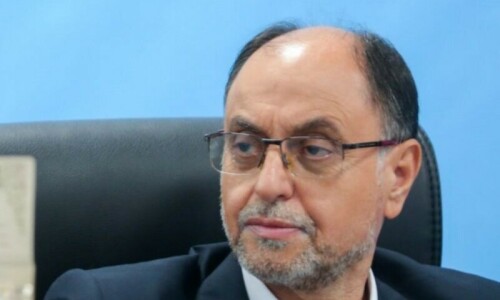 MANY have suffered in the March 2005 and June 2006 crises of stock market. Investors, brokers, analysts, stock exchanges, SECP, government - all have either lost money or face. Perhaps, it is SECP that has suffered the most. Its loss of credibility has been dramatic. Few seem to remember that when it began its operations in 1999, SECP was perceived as the most promising regulatory body in the country.
MANY have suffered in the March 2005 and June 2006 crises of stock market. Investors, brokers, analysts, stock exchanges, SECP, government - all have either lost money or face. Perhaps, it is SECP that has suffered the most. Its loss of credibility has been dramatic. Few seem to remember that when it began its operations in 1999, SECP was perceived as the most promising regulatory body in the country.
These days adding to SECP’s misery is the highly publicised controversy surrounding its last chairman, Dr Tariq Hassan. It appears that government high ups and some stock brokers are keen to “close this chapter” by pinning all the blame of March crisis on Dr Hassan while ordinary citizens see him as a victim of power politics.
Clearly, SECP, as an institution, is above its chairmen. To borrow from Dr Hassan’s recent press statement, “it is imperative … that we do not focus merely on personalities, whether past or present, whether in power or out of it, but look backwards to assess the weaknesses of a system that allows the recurrence of situations such as March 2005.”
Analysis of SECP’s ineffectiveness in regulating stock market shows that there is but one weakness in the system - lack of good governance in federal government and at SECP.
Problems of governance in government are too obvious to be stated. The reasons this government, like some of its predecessors, became so involved in stock market is that it could not resist the temptation to use KSE-100 index as “evidence” of its economic success.
Government’s economic managers, some of whom are perceived to be quite close to big stock brokers, used to proudly claim that KSE was “best performing market of the world” and a rising KSE-100 was barometer of Pakistan’s economy. They did not care that KSE’s “best performance” was merely based on percentage increase in KSE-100 and this index and this market have very limited economic relevance and hardly any link with life of a common man.
Such political propaganda about stock market convinced few Pakistanis, but it did tie the hands of SECP, which knew that any reform, no matter how justified, once linked to a fall in KSE-100 would invoke the wrath of government.
Despite SECP’s “autonomy” under the SEC Act 1997, federal government exercises direct powers over this regulatory body, which include power to appoint its chairman, other commissioners and chairman of SECP’s policy board.
Taking advantage of government’s political stakes in stock market, some powerful stock brokers have turned KSE-100 into a negotiating tool. All they have to do to block and even malign SECP is to cause a downfall in the index.
They know that soon government machinery would be set into motion to bring KSE-100 back to a politically correct level. Following March crisis, interference of the country’s economic managers into affairs of SECP is said to be on the rise, at times verging on micro management. Thus primary responsibility of SECP’s ineffectiveness in doing its job lies with the government.
The next person responsible for SECP’s ineffectiveness is SECP itself. There is much that SECP could have done, but did not do, to improve its governance and lay a sustainable foundation for regulation. Reality is that core elements of good governance have been largely missing in workings of SECP.
First of these elements is accountability. It is the policy board of SECP that is supposed to oversee its performance and make policies regarding SECP. Conventionally, SECP’s chairman has also been the chairman of policy board. Clearly, this sort of overseeing does not help. Composition of policy board is specified in SECP Act. It has no representation from investing public, which provides SECP with its reason for existence. Majority of its members are ex- officio, coming from other bureaucracies, most of which have very little to show for themselves. Members of policy board from private sector are also chosen so that they would look good on paper and be toothless in practice.
Thus, its not a surprise that SECP’s policy board has not made any perceptible effort to fulfill its purpose and its composition suggests that it is also unlikely to do so in future. Due to lack of accountability by the policy board, SECP chairman is considered all powerful in internal matters. This has resulted in highly controversial decisions, some of which led to court cases and caused great damage to SECP.
It was well within the domain of SECP to recommend to federal government to let an individual, other than its chairman, chair its policy board and take its first step towards internal accountability – something it still hasn’t done.
Second element of good governance that SECP is yet to espouse is transparency. It is an irony that SECP, which is champion of transparency in corporate sector, has never published its financial accounts in its annual report. Nothing can justify such lack of elementary transparency.
SECP’s annual reports tend to give a highly exaggerated account of SECP’s performance. If one were to believe even some of the regulatory achievements of its Securities Market Division, nothing like March 2005 and June 2006 crises could ever have happened.
These reports quite needlessly glorify SECP’s chairmen by publishing their photos on the cover. SECP’s website is also full of meaningless information about its vision, mission, strategy etc focusing more on SECP rather than the needs of investing public. It was always SECP’s own decision to make fair and full disclosure of its financials and regulatory performance to the public - a decision it is yet to take.
Third missing element of good governance at SECP is delegation coupled with meritocracy. Technically, executive directors should be running its different divisions but due to SEC Act and SECP’s internal dynamics, chairmen and those commissioners, whom the chairman likes, run the show with minimal delegation across the organisation.
Thus there has been inevitable friction between commissioners and executive directors, in which the commissioners have prevailed. There has been substantial turnover in executive directors and SECP has found it increasingly difficult to replace them.
Clearly, those who enjoy concentration of power cannot hire and promote competence because competent people do not make good yes-men. Talents of many junior directors, who are largely qualified professionals, are also wasted. They are turned into glorified clerks, whose only job is to draft note portions and letters as directed or expected from the top.
Being a regulatory body, SECP is an extreme case of a knowledge based organisation. It should and could have hired and retained the best of minds, which it did not.
While SECP’s chairmen and for that matter governments would come and go, cost of having a weak regulator of capital market and corporate sector of the entire country would be borne by the investing public.
If government is sincere in making SECP an independent and effective securities regulator, it should prove it through its actions. The least it can do is to liquidate its political stakes in stock market, amend SEC Act reducing its direct powers over SECP and strengthening SECP’s internal controls, and stop interfering in SECP’s affairs though any indirect means such as giving statements about stock market issues.
Top management of SECP should also put the institution above itself by implementing good governance practices to regain its lost credibility. If and when there is improvement in governance at federal government and SECP, we shall see an improvement in SECP’s performance and vice versa.














































Dear visitor, the comments section is undergoing an overhaul and will return soon.